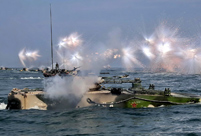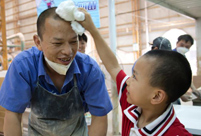 Amphibious armored vehicle unit conducts open sea drill
Amphibious armored vehicle unit conducts open sea drill
 Water relay in Henan
Water relay in Henan
 Ethnic culture feasts eyes of travelers
Ethnic culture feasts eyes of travelers
 80 security dogs assembled in Nanjing police dog training base
80 security dogs assembled in Nanjing police dog training base
 Graffiti artists paint on street walls in Xinjiang
Graffiti artists paint on street walls in Xinjiang
 Story of ceramic artist Zhang Lingyun
Story of ceramic artist Zhang Lingyun
 Magic summer night dream in Hongyuan
Magic summer night dream in Hongyuan
 Incredible creatures in headwaters drainage region of Lancang River
Incredible creatures in headwaters drainage region of Lancang River
 The future of rock n' roll seen in young rockers in China
The future of rock n' roll seen in young rockers in China
 Magnificent Yanziya Cliff
Magnificent Yanziya Cliff
UNITED NATIONS, Aug. 13 -- Two senior UN officials on Wednesday condemned in the strongest terms the "barbaric acts" of sexual violence and "savage rapes" the armed group Islamic State ( IS) has perpetrated on minorities in areas under its control.
In a joint statement from Baghdad, the special representative of the UN secretary-general on sexual violence in conflict, Zainab Hawa Bangura, and the special representative of the UN secretary- general for Iraq, Nickolay Mladenov, urged the immediate protection of civilians, UN spokesman Stephane Dujarric told reporters here.
"They say that they have received atrocious accounts on the abduction and detention of Yazidi, Christian, Turkomen and Shabak women, girls and boys, and reports of savage rapes," Dujarric said. "Some 1,500 Yazidis and Christians may have been forced into sexual slavery."
"We are gravely concerned by continued reports of acts of violence, including sexual violence against women and teenage girls and boys belonging to Iraqi minorities," Bangura and Mladenov said.
The two officials condemned, in the strongest terms, the explicit targeting of women and children and the barbaric acts the IS has perpetrated on minorities. Acts of sexual violence are grave human rights violations that can be considered as war crimes and crimes against humanity, they warned.
Tens of thousands of Iraqi refugees fled into the mountains, perhaps hoping to reach the Kurdish region in north Iraq, but were trapped because of militant activity between the mountain and the Kurdish area, and were running short of food and water.
Mladenov called on regional governments and the wider international community for the immediate release of the women and girls held in captivity and to support the government of Iraq's efforts to protect its citizens. He pledged that his office would closely monitor the situation to ensure accountability and advocate for support to the survivors of the "barbaric acts."
Meanwhile, on the humanitarian front, the UN World Health Organization (WHO) on Wednesday said it is supporting delivery of urgently needed services to tens of thousands of people still trapped on Sinjar Mountain.
"The humanitarian situation of the civilian population on Sinjar Mountain is alarming due to the narrow corridors for transporting essentials such as medicines, food and water, especially with the soaring temperatures which are reaching up to 111 degrees Fahrenheit (44 degrees Celsius)," said Jaffar Hussain, WHO's representative to Iraq.
So far, the WHO has deployed two mobile medical teams to Sinjar Mountain to provide essential services and distribute high-protein biscuits to people still stranded there. The two teams will be stationed there until the evacuation of all displaced people from the mountain.
In the past several days, more than 60,000 have crossed the Feshkhabour border-point through Syria to enter back into Iraq at Dohuk. The threat of disease outbreaks in crowded shelters there is very present, Hussain warned. Plus, people suffering from noncommunicable diseases, like diabetes and cancer, need urgent care. Mothers still need to deliver babies, he added.
Currently, 10 mobile medical teams are in Dohuk to provide essential healthcare. All hospitals are on high alert and require space prepared to receive patients among the new families arriving. The WHO has also recruited 50 nurses to support local teams.
At the Iraqi-Syrian border point of Feshkhabour, 16 ambulances, two medical doctors and 10 paramedics are providing care. The WHO, in conjunction with the Iraqi Ministry of Health and the UN Children's Fund (UNICEF), is undertaking a five-day polio vaccination campaign across the country, with the aim of immunizing 4 million children under the age of five years.
The WHO is also making contingency plans for the delivery of medical supplies into Iraq after several airlines canceled or reduced flights into the country. Strategies being considered involve local procurement of medicines, and the use of the Mersin port in Turkey and Um Qasr Port in Basra, Iraq, UN officials said here.
 Beijing policewomen posters become a hit
Beijing policewomen posters become a hit Armored regiment trains on the sea
Armored regiment trains on the sea Children spend 'Father's Day' with dads at work
Children spend 'Father's Day' with dads at work 'Pan Da' appear in Shanghai World Financial Center
'Pan Da' appear in Shanghai World Financial Center Champions take selfies on podium
Champions take selfies on podium National Fitness Day celebrated around China
National Fitness Day celebrated around China Traditional culture colors summer vacation
Traditional culture colors summer vacation Young athletes fighting for their dreams
Young athletes fighting for their dreams 68 meters high thermometer in Shanxi, called ‘fighter’ of thermometers
68 meters high thermometer in Shanxi, called ‘fighter’ of thermometers The vanishing folk skills
The vanishing folk skills Intoxicating beauty of Dali, Yunnan province
Intoxicating beauty of Dali, Yunnan province Memorable moments of Ludian earthquake
Memorable moments of Ludian earthquake Bring world together to help elephant
Bring world together to help elephant 'Building Dreams'
'Building Dreams'  Labrang Monastery
Labrang MonasteryDay|Week|Month